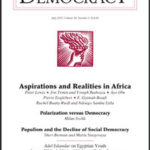 Why do ordinary people vote to return to office undemocratic incumbents? New survey experiments in several countries suggest that many voters are willing to put their partisan interests above democratic principles—a finding that may be key to understanding democratic backsliding, notes analyst Milan W. Svolik. Aspiring autocrats succeed in subverting democracy only when given the opportunity by a factious public, he writes in Polarization versus Democracy, an article for the Journal of Democracy:
Why do ordinary people vote to return to office undemocratic incumbents? New survey experiments in several countries suggest that many voters are willing to put their partisan interests above democratic principles—a finding that may be key to understanding democratic backsliding, notes analyst Milan W. Svolik. Aspiring autocrats succeed in subverting democracy only when given the opportunity by a factious public, he writes in Polarization versus Democracy, an article for the Journal of Democracy:
 As Chávez, Putin, and Erdoğan have eroded democracy in their countries, they have done so with the tacit and sometimes explicit consent of significant portions—sometimes majorities—of their electorates. To be clear, this is not to exculpate autocrats. Only in rare instances have ordinary people actually demanded dictatorship, and even in those cases, these were small fractions of the public, as Nancy Bermeo has documented.18 But because democratic backsliding is a process that starts from a democratic status quo, ordinary people play a central role in it. They are indispensable, even if reluctant, accomplices. RTWT
As Chávez, Putin, and Erdoğan have eroded democracy in their countries, they have done so with the tacit and sometimes explicit consent of significant portions—sometimes majorities—of their electorates. To be clear, this is not to exculpate autocrats. Only in rare instances have ordinary people actually demanded dictatorship, and even in those cases, these were small fractions of the public, as Nancy Bermeo has documented.18 But because democratic backsliding is a process that starts from a democratic status quo, ordinary people play a central role in it. They are indispensable, even if reluctant, accomplices. RTWT
Jiu-jitsu politics
 But why are today’s voters so susceptible to populist charms? Catherine Fieschi asks in Populocracy: The Tyranny of Authenticity and the Rise of Populism. Her thesis is that digital technology has made us receptive to populism by exalting immediacy, simplicity and transparency. Without complexity, delay and frustration we do not pause for reflection, The FT’s Ben Hall writes.
But why are today’s voters so susceptible to populist charms? Catherine Fieschi asks in Populocracy: The Tyranny of Authenticity and the Rise of Populism. Her thesis is that digital technology has made us receptive to populism by exalting immediacy, simplicity and transparency. Without complexity, delay and frustration we do not pause for reflection, The FT’s Ben Hall writes.
Populism is effective because it has emerged from within the democratic tradition and is able to turn some of democracy’s strengths against it in what she calls Jiu-jitsu politics. Populism is not simply a response to globalization by the “disillusioned” or “left behind”, but a consequence of the digital revolution’s impact on political expectations.







